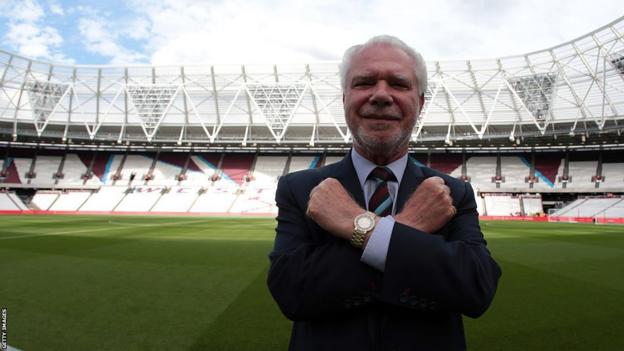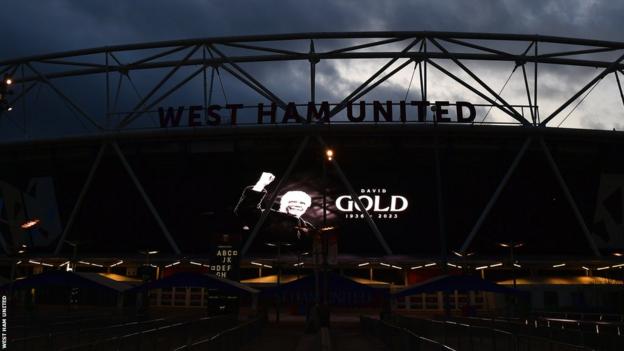David Gold: West Ham United co-chairman dies following short illness
Last updated on .From the section West Ham

West Ham United co-chairman David Gold has died at the age of 86 following a short illness
A lifelong Hammers fan, the club said he passed away "peacefully" on Wednesday morning with his fiancee and daughters by his side.
Gold, previously the chairman and co-owner of Birmingham City, became joint-chairman at West Ham with David Sullivan in 2010.
"I am extremely sad to hear this news," said manager David Moyes.
"On behalf of all of the players and my staff at the training ground, I would like to extend our deepest sympathies to David Gold's family at this very difficult time.
"Mr Gold was a regular visitor to Rush Green and always a source of great support and encouragement to myself and the players. It was clear he had a genuine and sincere love for the club and was a true supporter at heart.
"He took a great interest in the people working behind the scenes and was always keen to help in any way he could. He will be greatly missed."
Gold grew up directly opposite the Boleyn Ground - West Ham's former stadium - and played for the club's boys' and youth teams.
"Of all our joint ventures, none gave us more pride and happiness than the day we took ownership of West Ham United, our club, in January 2010," said Sullivan.
"David had a long-standing connection with the Hammers, having grown up opposite the Boleyn Ground in Green Street, and represented the club at junior level.
"He always wanted what was best for West Ham United, and his passing is a great loss for all of us."
Both West Ham and Leeds players will wear black armbands during their Premier League match at Elland Road on Wednesday.
Gold was at Birmingham City for 16 years, selling his shares in 2009 before he and Sullivan took over at West Ham in January 2010.
West Ham said their takeover "helped to steady the ship and protect the club's future during a period of great financial uncertainty".
His tenure at the club oversaw its move to the London Stadium, as well as relegation and subsequent promotion back to the Premier League and playing in the Europa League.
Outside of football, Gold was also the chairman of retail chain Ann Summers and previously co-owned an adult magazine company and corporate air service.
Writing on Twitter, Birmingham City said it was "devastated" to learn of Gold's passing.
Tributes paid to a 'complete gentleman'
West Ham vice-chairman Karren Brady led the tributes to Gold on Twitter, saying he was a "great man, a great friend and a complete gentleman".
Former Hammers forward Carlton Cole said: "Mr Gold was a favourite of mine at the club.
"Always had time for me and wanted me to win in life. A very kind and warm-hearted man."
Ex-striker Clinton Morrison said Gold "made him feel welcome" when he signed for Birmingham in 2002, while former Blues midfielder Curtis Woodhouse said he had "reached out to try and help" during difficult times at the club.
Premier League chief executive Richard Masters said Gold "will be truly missed" having helped progress the game from his position.
"David has been around the Premier League shareholders' table for more than 20 years, with both West Ham and Birmingham, and leaves a great legacy and a host of good friends," said Masters.
"David's contribution to the game goes beyond the progress he oversaw at West Ham, and includes a big impact throughout football and the Premier League itself."

Analysis
BBC Sport's Simon Stone
To people inside West Ham, David Gold will be thought of fondly as a kind, gentle presence, always interested in the wellbeing of staff and keen to be kept updated on events around the day-to-day running of the club.
An East Ender and West Ham fan to the core, Gold - or DG to those who knew him - was visual, standing proudly at the London Stadium last September as the statue of Bobby Moore, Sir Geoff Hurst and Martin Peters was unveiled, watching on in May as the academy pitch was named in honour of skipper Mark Noble, who retired last season.
He would happily shake hands, say hello and wish people all the best. He was a frequent visitor to the Hammers' Rush Green training complex, particularly in the David Moyes era, chatting over lunch with the Scot and his staff.
Gold loved West Ham. He always did. He always felt his actions were in the best interests of the club, even when he was so heavily criticised.
He did have a thick skin, as every club owner needs, but those who knew him say Gold genuinely wanted West Ham to succeed. At the end of last season, it was a huge disappointment to see the club fall at the semi-finals in Europe, when success was so tantalisingly close.
Gold rose from exceptionally humble beginnings, selling buttons from a stall outside his house to being chairman of a company that owned, among other things, the Ann Summers chain, which helped earn him some rather crude nicknames.
In business terms, he was a success story.
Clearly, there is another view.
Those West Ham fans who are committed to the 'Gold, Sullivan, Brady Out' campaign may not have Gold first in the queue for being responsible for perceived broken promises around the London Stadium move and then either bad or insufficient investment on the playing side, but they have still been vocal in saying the club would be better off under different stewardship.
Gold's 25.1% made him the third highest shareholder in the club, behind long-time business partner David Sullivan and new investor, Czech businessman Daniel Kretinsky.
It will now be fascinating to see if those shares remain with the Gold family or if they are sold - and where to.
- Visit our West Ham page for all the latest Hammers news, analysis and fan views
- You can now get West Ham news notifications in the BBC Sport app - find out more

- Our coverage of West Ham United is bigger and better than ever before - here's everything you need to know to make sure you never miss a moment
- Everything Hammers - go straight to all the best content







